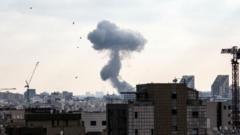As the US conducts unprecedented military operations against Iran, the possibilities for conflict escalation loom large. Iranian Supreme Leader Ayatollah Khamenei now faces critical decisions that will affect the future of both the Islamic Republic and its adversaries.
Escalating Tensions: US-Iran Relations at a Crossroads

Escalating Tensions: US-Iran Relations at a Crossroads
Recent military strikes by the US on Iranian nuclear sites mark a significant escalation, prompting fears of potential fallout and retaliation from Tehran.
The longstanding tension between the United States and Iran has faced a pivotal moment as the US executes direct military strikes on key Iranian nuclear sites, an unprecedented action that raises alarms around the globe. This marks a drastic departure from previous administrations' hesitance to engage in military confrontation with the Islamic Republic, typically prioritizing diplomacy over armed conflict.
President Trump's decision represents a significant escalation in the second term of a leader who has positioned himself as an unconventional figure willing to shatter old paradigms. The implications of this aggression could lead to unforeseeable consequences, especially as Iran's 86-year-old Supreme Leader Ayatollah Ali Khamenei, now reportedly in hiding, weighs his next strategic move.
Khamenei has managed to navigate decades of fraught relations with the US, carefully balancing responses to ensure the survival of the Islamic Republic. The choices before him are perilous—reacting too forcefully might threaten his regime, while a lack of response could undermine his authority. Experts warn that his upcoming decisions could reshape the narrative of the Iranian position on the global stage.
Following a series of Israeli airstrikes, Iran's military infrastructure has been severely compromised, with high-level leaders and nuclear scientists targeted. The Islamic Revolutionary Guard Corps (IRGC) has issued threats of retaliation, underscoring Iran's desire to project strength amidst growing vulnerability. Nevertheless, analysts agree this is not a conflict Iran seeks to pursue.
The recent US involvement increases pressure on Iran, suggesting a turning point in military engagements. While some argue that any direct attack on US military bases could lead to devastating repercussions, the Iranian regime is confronted with an urgent need to maintain its regional standing.
Diplomatic efforts, previously brokered through indirect negotiations, appear increasingly futile as tensions escalate. Iranian foreign minister Abbas Araghchi has criticized the US for betraying the dialogue process, arguing that ongoing bombings strain the possibility for diplomatic resolution.
Amid the chaos, European leaders have called for an urgent de-escalation approach, emphasizing mediation rather than missile strikes to curtail Iran's nuclear ambitions. As both nations grapple with the implications of this conflict, experts predict a difficult road ahead as decision-makers in Iran recalibrate their strategies, all while attempting to navigate the complexities of international scrutiny and regional alliances.
The situation remains fluid, highlighting the precarious nature of US-Iran relations. The balance between military action and diplomatic talks teeters on a knife's edge, making every subsequent move from both countries critical in determining the future trajectory of this long-standing conflict.






















